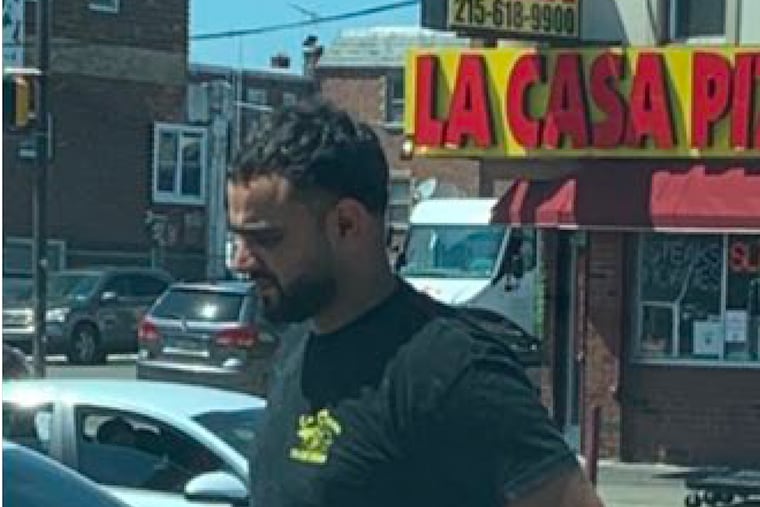North Philadelphia landlord convicted of setting the blaze that led to the death of fire Lt. Sean Williamson
A jury found that Al-Ashraf Khalil conspired to set his Fairhill pizzeria ablaze. The building collapsed, killing a veteran firefighter.

A Fairhill landlord faces the potential of life in prison after a federal jury found him guilty Thursday of setting a 2022 blaze that caused the death of a Philadelphia Fire Department lieutenant and injuries to five others.
The panel of six men and six women concluded that Al-Ashraf Khalil, 30, conspired to ignite to the building he owned at 300 W. Indiana Ave., hoping to collect on its nearly $500,000 insurance policy. The structure collapsed after the fire had been put out, burying Lt. Sean Williamson, a 27-year veteran of the department, under the rubble.
Williamson, 51, died, unable to breathe. Four other firefighters and an inspector from the Department of Licenses and Inspections survived with injuries.
Jurors on Thursday convicted Khalil on counts including conspiracy, arson, and wire fraud, and also found codefendant Isaam Jaghama, 30, guilty of helping him set the blaze.
“But for these defendants, it never would have started, the building would still stand, and Lt. Williamson would still be with his family — a wholly preventable tragedy, sparked by greed,” U.S. Attorney Jacqueline C. Romero said in a statement after the jury’s decision. “While today’s convictions can never make up for such an immeasurable loss, they ensure a measure of justice for Lt. Williamson, the Williamson family, and the dedicated first responders of the Philadelphia Fire Department.”
» READ MORE: ‘Truly one of our best’: Hundreds mourn Philadelphia firefighter killed in Fairhill building collapse
The verdict came after an eight-day trial in which Khalil’s attorney attempted to persuade jurors that while the landlord might have set his building ablaze, it was the negligence of fire officials that ultimately caused Williamson’s death.
Incident commanders on the scene should have known better than to send the lieutenant and others into the 100-year-old structure minutes after it had been damaged by fire and the hundreds of gallons of water firefighters used to extinguish the conflagration, defense lawyer Gerald A. Stein maintained during his closing pitch to jurors Wednesday.
“There was an intervening cause of death and injury above and beyond the control of Mr. Khalil — the failure to properly supervise the men at that scene and give them a fair chance of doing their jobs and coming out safely,” Stein said during closing arguments.
That distinction — of who bears the blame for Williamson’s death — and the jury’s rejection of Stein’s argument will prove central at sentencing hearings for Khalil and Jaghama next year.
The federal arson charge carries a mandatory minimum sentence of five years and up to 20 years behind bars. But in cases where jurors conclude the fire directly resulted in a death, a convicted defendant can be sentenced to life.
Though the jury was not instructed on the potential punishments Khalil and Jaghama might face, prosecutors balked at Khalil’s efforts to blame the fire department and urged jurors to hold him and Jaghama accountable for the damage they had wrought.
“The defendants lit an occupied building on fire in the middle of the night and want you to blame the firefighters who showed up in the middle of the night to save their home?” Assistant U.S. Attorney Amanda Reinitz scoffed as she addressed the jury. “None of these men would have been there if the defendants had not set the building on fire.”
Khalil, co-owner a of a pizza restaurant in Juniata Park, had bought the Indiana Avenue building less than a year before the blaze, in hopes of renovating it and quickly turning a profit.
But evidence presented at trial showed that when he failed to sell it at the price he expected, he quickly began plotting burning it to the ground.
Surveillance footage showed Khalil and Jaghama, a friend he had enlisted to aid him in the effort, entering the building’s basement just after 1:30 a.m. on June 18, and leaving moments later as flames began to engulf it.
Khalil had leased the structure’s two upper floors to two employees at his pizza shop whom he had known for years and who were inside at the time with their families and young children. They managed to escape in time, but Khalil did nothing to warn them.
He returned to the scene later that night to watch firefighters battle the fire he set and was at the scene when Williamson and the others entered the building just before 2:30 a.m. and then, later, as the building eventually collapsed.
“Yes, there were structural problems in a 100-year-old rowhome in Philadelphia,” said Reinitz, the prosecutor. “But who knows the building better? The firefighters who show up in the middle of the night to put out a fire, or the guy who owns it?”
It took six days after the collapse for authorities to charge and arrest Khalil — and only after he had attempted to flee the country for Jordan, booking two separate plane tickets in his name under U.S. and Palestinian passports.
Jordanian officials turned him away shortly after he landed, sending him back to John F. Kennedy International Airport, where agents with the U.S. Bureau of Alcohol, Tobacco, Firearms, and Explosives were waiting to arrest him.
Both Khalil and Jaghama have remained in custody since their arrests.
Stein, Khalil’s attorney, did not respond to requests for comment after Thursday’s verdict.
“Mr. Jaghama was disappointed with the verdict and plans to appeal,” his attorney, Michael N. Huff, said. “Our hearts go out to the firefighters and their families who suffered.